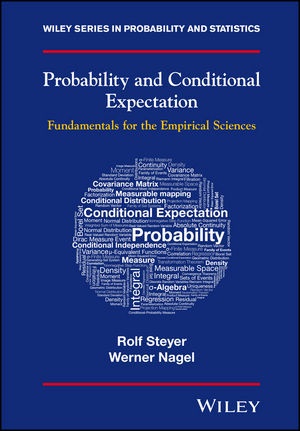Read more
Probability and Conditional Expectations bridges the gap between books on probability theory and statistics by providing the probabilistic concepts estimated and tested in analysis of variance, regression analysis, factor analysis, structural equation modeling, hierarchical linear models and analysis of qualitative data. The authors emphasize the theory of conditional expectations that is also fundamental to conditional independence and conditional distributions.
Probability and Conditional Expectations
* Presents a rigorous and detailed mathematical treatment of probability theory focusing on concepts that are fundamental to understand what we are estimating in applied statistics.
* Explores the basics of random variables along with extensive coverage of measurable functions and integration.
* Extensively treats conditional expectations also with respect to a conditional probability measure and the concept of conditional effect functions, which are crucial in the analysis of causal effects.
* Is illustrated throughout with simple examples, numerous exercises and detailed solutions.
* Provides website links to further resources including videos of courses delivered by the authors as well as R code exercises to help illustrate the theory presented throughout the book.
List of contents
Part I Measure-Theoretical Foundations of Probability Theory
1 Measure 3
1.1 Introductory Examples 3
1.2 sigma-Algebra and Measurable Space 4
1.2.1 sigma-Algebra Generated by a Set System 9
1.2.2 sigma-Algebra of Borel Sets on Rn 12
1.2.3 sigma-Algebra on a Cartesian Product 13
1.2.4 intersection -Stable Set Systems That Generate a sigma-Algebra 15
1.3 Measure and Measure Space 16
1.3.1 sigma-Additivity and Related Properties 17
1.3.2 Other Properties 18
1.4 Specific Measures 20
1.4.1 Dirac Measure and Counting Measure 21
1.4.2 Lebesgue Measure 22
1.4.3 Other Examples of a Measure 23
1.4.4 Finite and sigma-Finite Measures 23
1.4.5 Product Measure 24
1.5 Continuity of a Measure 25
1.6 Specifying a Measure via a Generating System 27
1.7 sigma-Algebra That is Trivial With Respect to a Measure 28
1.8 Proofs 28
1.9 Exercises 31
2 Measurable Mapping 41
2.1 Image and Inverse Image 41
2.2 Introductory Examples 42
2.2.1 Example 1: Rectangles 42
2.2.2 Example 2: Flipping two Coins 44
2.3 Measurable Mapping 46
2.3.1 Measurable Mapping 46
2.3.2 sigma-Algebra Generated by a Mapping 51
2.3.3 Final sigma-Algebra 54
2.3.4 Multivariate Mapping 54
2.3.5 Projection Mapping 56
2.3.6 Measurability With Respect to a Mapping 56
2.4 Theorems on Measurable Mappings 58
2.4.1 Measurability of a Composition 59
2.4.2 Theorems on Measurable Functions 61
2.5 Equivalence of Two Mappings With Respect to a Measure 64
2.6 Image Measure 67
2.7 Proofs 70
2.8 Exercises 75
3 Integral 83
3.1 Definition 83
3.1.1 Integral of a Nonnegative Step Function 83
3.1.2 Integral of a Nonnegative Measurable Function 88
3.1.3 Integral of a Measurable Function 93
3.2 Properties 96
3.2.1 Integral of mu-Equivalent Functions 98
3.2.2 Integral With Respect to a Weighted Sum of Measures 100
3.2.3 Integral With Respect to an Image Measure 102
3.2.4 Convergence Theorems 103
3.3 Lebesgue and Riemann Integral 104
3.4 Density 106
3.5 Absolute Continuity and the Radon-Nikodym Theorem 108
3.6 Integral With Respect to a Product Measure 110
3.7 Proofs 111
3.8 Exercises 120
Part II Probability, Random Variable and its Distribution
4 Probability Measure 127
4.1 Probability Measure and Probability Space 127
4.1.1 Definition 127
4.1.2 Formal and Substantive Meaning of Probabilistic Terms 128
4.1.3 Properties of a Probability Measure 128
4.1.4 Examples 130
4.2 Conditional Probability 132
4.2.1 Definition 132
4.2.2 Filtration and Time Order Between Events and Sets of Events 133
4.2.3 Multiplication Rule 135
4.2.4 Examples 136
4.2.5 Theorem of Total Probability 137
4.2.6 Bayes' Theorem 138
4.2.7 Conditional-Probability Measure 139
4.3 Independence 143
4.3.1 Independence of Events 143
4.3.2 Independence of Set Systems 144
4.4 Conditional Independence Given an Event 145
4.4.1 Conditional Independence of Events Given an Event 145
4.4.2 Conditional Independence of Set Systems Given an Event 146
4.5 Proofs 148
4.6 Exercises 150
5 Random Variable, Distribution, Density, and Distribution
About the author
Rolf Steyer,
Institute of Psychology, University of Jena, Germany Werner Nagel,
Institute of Mathematics, University of Jena, Germany
Summary
Probability and Conditional Expectations bridges the gap between books on probability theory and statistics by providing the probabilistic concepts estimated and tested in analysis of variance, regression analysis, factor analysis, structural equation modeling, hierarchical linear models and analysis of qualitative data.

